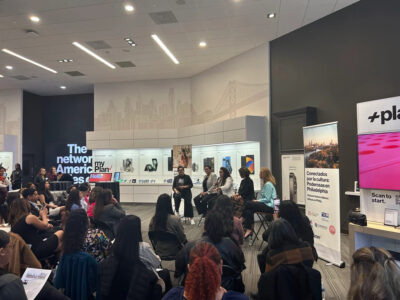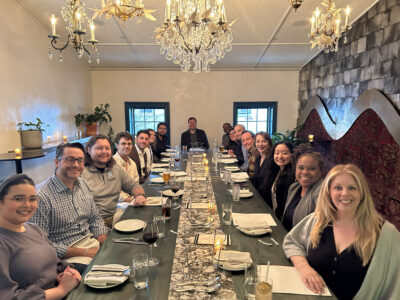Last month, at a co-working space in New York City’s Tribecca neighborhood, Philly took over.
There, Good Company Ventures CEO Garrett Melby and COO Christopher Bentley kicked off the incubator’s 2010 class in New York City with a star-studded (for the VC world, anyway) panel about social entrepreneurship that included Union Square Ventures co-founder Fred Wilson and Acumen co-founder Jacqueline Novogratz.
The event marked the start of broad campaign by Good Company Ventures to promote their incubator for social entrepreneurs and helped Philly make its case as the country-wide hub of the social entrepreneurs movement.
We sat down with Melby, who spoke at this month’s Ignite Philly, to talk about invading the 67th Ward, the incubator’s future plans and why he only has 70 Twitter followers.
Edited for length and clarity.
###
Can you explain what Good Company Ventures is and how it’s different from other venture capital firms?
It’s not a VC firm, it’s a service organization. What we are doing is applying strategies and resources of a venture community to social entrepreneurs. I think that’s unique in the country at this point: trying to accelerate the outcomes for social entrepreneurs.
Last year was GCV’s first class. What did you learn? Do you have any changes in store for this year?
Last year, we ran the program with a small network of founders. This year we’ve seen a great response from the VC world to our idea, so we’re working hard to build a much broader community and get really a solid buy-in from the VC community that has seen the impact of social entrepreneurship.
That’s why we did the event in New York, to get validation from that community. People like Fred Wilson. And that’s also why we are having the event in Philly on April 14th with (First Round Capital Managing Partner) Josh Kopelman.
It’s a similar format as Y Combinator and DreamIt Ventures but it’s more of a service mentality without taking equity. We just want to see these companies evolve.
At the New York event, Jia Ji (CEO of Couchange) asked where the next center of social entrepreneurship should be, and a surprising number of people said Philadelphia. What was your reaction to that?
My reaction was what I presented at Ignite, in a sense. One of the founding figures in the U.S. social enterprise movement Judy Wicks, the founder of White Dog Cafe, is from Philly. She was instrumental in driving the community in the first generation of social investment in the past ten years. Philadelphia has always been the center of gravity for this kind of thing.
But in the last three years we have B-corp, making the process more measurable and certifiable and we did our incubator last year. As people begin to regionalize and they do their first chapter of their social investment cycle, they look in Philadelphia.
There’s also a short list of venture funds that explicitly deal in social entrepreneurship and one of those is here in Philly: Murex. They are raising $50 million and that would be much bigger fund than any other (socially focused investment firm).
San Fransisco has all the smart young people who orient this way, the style of social investment is foreign to the east coast, so you end up getting reactions of skepticism about “social” being pejorative. They don’t want their [managing partners] to think they are crazy.
I noticed you only have 60 followers on Twitter. Trying to bump that up?
It’s a questions of investment. I’ve been doing it for two months and my attention and persistence with it is evolving. We are trying to build a community and we have a very small staff.
There is so much more we can do: regional workshops, online communities and mentorship programs…
So it sounds like Good Company Ventures has bigger ambitions than the incubator.
Good Company Ventures is a platform and community for social entrepreneurs. The incubator is our first project and it takes up 90 percent of my time, but it doesn’t limit what we’ve hoped to do with it.
Why did you choose social entrepreneurship? What was the moment that you realized this is for you?
This is my third career. I was a lawyer first and then a VC. I decided that my third career would put good intentions first and figure out the rest of it as we went along. That’s the personal story.
The structural answer turns out to be a play of the Willie Sutton bank robber quote [“Why do I rob banks? Because that’s where the money is”].
I believe this is a big movement. There are a lot of people with a lot of money to put to work. They want to inject meaning in their professional endeavors.
If you look at folks in their 20s, in business school, they are committed to finding ways of reconciling purpose and profit. We could be at the ground floor of a growing trend.
-30-
Every Friday, Technically Philly brings you an interview with a leader or innovator in Philadelphia s technology community. See others here.
Join the conversation!
Find news, events, jobs and people who share your interests on Technical.ly's open community Slack

Philly daily roundup: A better coffee supply chain; Philly Tech Week returns; Apply to Pennovation Accelerator

Philly daily roundup: Startups want office culture; New Venture Lab cohort; Penn Med's new AI leader

What AI means for the future of SaaS: Reality vs. hype



